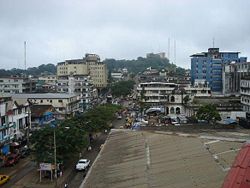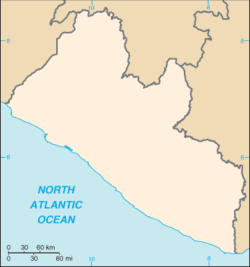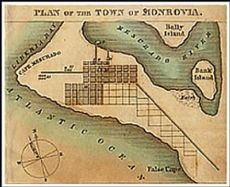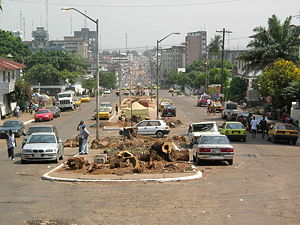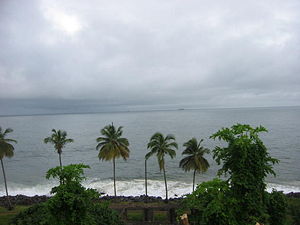Monrovia
2008/9 Schools Wikipedia Selection. Related subjects: Africa; Cities
| Monrovia | |
| A street in Monrovia, Liberia - Old Ducor Hotel in the background. | |
| Location within Liberia, West Africa | |
| Coordinates: | |
|---|---|
| Country | |
| Established | 1824 |
| Named for | James Monroe -U.S. President |
| Government | |
| - Mayor | Ophelia Hoff Saytumah |
| Population (2003) | |
| - Total | 570,971 |
| Time zone | GMT ( UTC+0) |
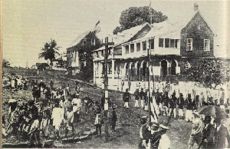
Monrovia, population 572,971 (2003 census), is the capital city of Liberia. It is also Liberia's largest city. The city's economy is dominated by its harbour, which was significantly expanded by U.S. forces during the second World War. Main exports include latex and iron ore. Materials are also manufactured on-site, such as cement, refined petroleum, food products, bricks and tiles, furniture and chemicals. The harbour also has a large amount of storage and facilities for repairing ships.
History
The area was already inhabited when it was named Cape Mesurado by Portuguese sailors in the 1560s. With the aim of establishing a self-sufficient colony for emancipated American survivors of slavery, something that had already been accomplished in Freetown, the first settlers from the United States under the auspices of the American Colonization Society arrived in Africa in 1821. They landed at Sherbro Island in present-day Sierra Leone. The undertaking was a shambles and many settlers died. In 1822, a second ship rescued the settlers and took them to Cape Mesurado, establishing the settlement of Christopolis. In 1824, the city was renamed to Monrovia after James Monroe, then President of the United States. It is the only non-American capital city named after a U.S. President.
In 1845, Monrovia was the site of the constitutional convention held by the American Colonization Society which drafted the constitution that would two years later be the constitution of an independent and sovereign Republic of Liberia .
In 1979, the Organisation of African Unity held their conference in Monrovia, with then president William R. Tolbert as chairman. During his term, Tolbert improved public housing in Monrovia and decreased by 50% the tuition fees at the University of Liberia. A military coup led by Samuel Doe ousted the Tolbert government in 1980, with many members being executed.
The city was severely damaged in the Liberian Civil War, notably during the siege of Monrovia, with many buildings damaged and nearly all the infrastructure destroyed. Major battles occurred between Samuel Doe's government and Prince Johnson's forces in 1990 and with the NPFL's assault on the city in 1992. A legacy of the war is a large population of homeless children and youths, either having been involved in the fighting or denied an education by it.
Economy
The city's economy is dominated by its harbour. Monrovia is Liberia's financial centre. The Central Bank of Liberia is based in Monrovia.
Government
The city is home to the Monrovia City Corporation, which runs many services inside the city.
Geography
Monrovia lies on a peninsula, between the Atlantic Ocean and the Mesurado River and is a major port. The Saint Paul River lies directly North of the city. Monrovia is located at . Monrovia is Liberia's largest city and its administrative, commercial and financial centre.
The city is located in Montserrado County; it is not the capital of Montserrado County.
Education
Monrovia is home to the University of Liberia, along with Cuttington College and Divinity School and many public and private schools.
Infrastructure
Boats link the city with Greenville and Harper, and the nearest airport is Roberts International Airport, 60 km (40 mi) away at Robertsfield. The city is connected with the rest of the country via a network of roads and railways. Monrovia is listed as the home port by between ten and fifteen percent of the world's merchant shipping, registered in Liberia under Flag of Convenience arrangements. Both private taxis and minibuses run in the city, and are supplemented by larger buses run by the Monrovia Transit Authority.
